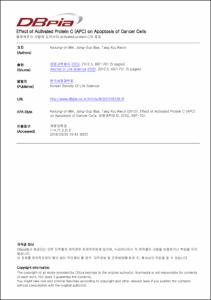종양세포의 사멸에 있어서의 activated protein C의 효과
- Keimyung Author(s)
- Kwon, Taeg Kyu
- Department
- Dept. of Immunology (면역학)
- Journal Title
- 생명과학회지
- Issued Date
- 2012
- Volume
- 22
- Issue
- 5
- Keyword
- Activated protein C (APC); Apoptosis; TRAIL; Caki cells; Kahweol
- Abstract
- Activated protein C (APC) has an anticoagulant effect and a non-hemostatic effect such as regulation of cell metastasis and modulation of inflammation. In this study, we investigated whether APC could modulate apoptosis in cancer cells. Tumor necrosis factor (TNF)-α , cyclohexamide, and FAS markedly induced apoptosis in human renal carcinoma Caki cells. When Caki cells were pretreated with APC, the percentage of death receptor-induced apoptosis did not change. Furthermore, we checked the effect of APC on tumor necrosis factor-related apoptosis-inducing ligand (TRAIL)-induced apoptosis in human glioma T98G and human breast carcinoma MDA231 cells. APC also had no effect on TRAIL-induced apoptosis in both cell lines. However, pretreatment with APC inhibited combination treatment (kahweol plus TRAIL and kahweol plus melatonin)-induced apoptosis and PARP cleavage in Caki cells. Taken together, our results suggest that APC can modulate anti-cancer therapeutic efficiency.
본 연구에서는 항응고제로서의 역할을 가지면서 또한 혈액응고와는 관련 없는 종양세포의 전이 등을 조절하는 것으로 알려진 activated protein C (APC)가 종양세포의 사멸에는 어떠한 영향을 미치는 지에 대한 연구를 수행하였다. Tumor necrosis factor (TNF)-α와 cyclohexamide를 병합 처리하거나 FAS를 처리하게 되면 인간 신장암세포인 Caki에서는 유의적인 세포사멸이 일어난다. 하지만, APC는 이러한 세포사멸에 아무런 영향을 미치지 못하였다. 또한 TRAIL을 인간 뇌 암세포인 T98G와 유방암세포인 MDA231세포에 처리하여 세포사멸을 일으켰을 때에도 APC는 세포사멸을 조절하지 못하였다. 그러나, TRAIL에 대한 민감도를 증가시키기 위한 kahweol과 TRAIL의 병합처리나, kahweol과 malatonin의 병합처리에 의한 신장암세포의 사멸은 APC에 의해 유의적으로 억제되는 것을 확인하였다. 따라서, 이는 APC가 항암치료의 효율성을 조절 할 수 있는 가능성을 가짐을 의미한다.
- Alternative Title
- Effect of Activated Protein C (APC) on Apoptosis of Cancer Cells
- Keimyung Author(s)(Kor)
- 권택규
- Publisher
- School of Medicine
- Citation
- 민경진 et al. (2012). 종양세포의 사멸에 있어서의 activated protein C의 효과. 생명과학회지, 22(5), 697–701.
- Type
- Article
- ISSN
- 1225-9918
- Appears in Collections:
- 1. School of Medicine (의과대학) > Dept. of Immunology (면역학)
- 파일 목록
-
-
Download
 oak-bbb-4365.pdf
기타 데이터 / 890.07 kB / Adobe PDF
oak-bbb-4365.pdf
기타 데이터 / 890.07 kB / Adobe PDF
-
Items in Repository are protected by copyright, with all rights reserved, unless otherwise indicated.